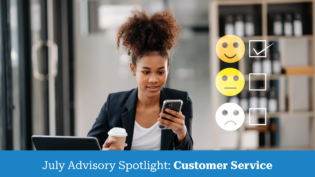Personalization vs. Privacy: Your Customers’ Confusing Brand Experiences
By: Elaine Fogel

How much business do you think you lose due to poor customer experiences?
Did you know that 41% of US consumers said they ditched a company because of “poor personalization and lack of trust?” And, only 22% of global customers acknowledge that the companies they do business with tailor their experiences based on a deep understanding of their needs, preferences, and past interactions. As President Trump always says, “Sad.”
According to the 13th annual Accenture Strategy Global Consumer Pulse Research, a massive $756 billion was lost this past year in retail and brand sales in the US and $2.5 trillion globally. Do you wonder what little piece of that pie is yours? ????
We’re facing a real marketing dilemma right now. On one hand, customers want more personalized and relevant brand experiences. In fact, 44% of US consumers said they’re frustrated when companies fail to provide that.
On the other hand, 49% of them said they’re concerned about personal data privacy, especially with increased use of digital voice assistants like Amazon’s Echo and Google Home. Our customers love technology but are worried about ‘Big Brother.’ Hence, we’re in a ‘Catch-22’ trying to find the perfect balance.
“As technologies such as artificial intelligence, machine learning and digital assistants become more sophisticated and mainstream, companies are creating new touch points, offerings and services that intelligently anticipate and flex to their customer’s precise needs, offering a level of hyper-relevance not experienced before. Those that succeed will hit a ‘sweet spot’ whereby U.S. customers will be willing to share more personal insights into their world in return for greater value and the confidence that their data is protected,” said Robert Wollan, senior managing director and Advanced Customer Strategy global lead at Accenture Strategy.
The big guys are trying to close the gap. Seventy-three percent of CEOs in this study acknowledge the need for products, services, and experiences that are more meaningful to their customers. So, instead of hit-and-miss personalization, they’re trying to provide an ‘always on’ approach called hyper-relevance. (Another new marketing buzzword.)
For small-to-medium businesses and organizations
If your business or organization is in the small-to-medium category, there’s no point sharing the study’s recommendations geared for enterprises. You may not have the resources to invest in predictive analytics, artificial intelligence (AI) and machine learning. However, there are basic takeaways that do apply to you.
Collect Important Data
“Nearly one third of consumers expect the companies with which they engage to know more about them. And two-thirds are willing to share personal information with companies.”
Using your current resources, focus on updating your customer profiles and data. The more you know about them, the better you can serve them with personalization and relevance. If you don’t have specific software to achieve this, there are some free and cheap customer relationship management (CRM) programs around.
Earn and Keep Customers’ Trust
Customers will provide their information to you in exchange for some perceived value. “If that value exchange—or the trust upon which it is based—is broken, customers will walk.”
How to do that without spending a fortune?
- Present your organization as trustworthy
- Keep your promises
- Meet (and exceed) customers’ expectations
- Put your customers at the center of every action (See chapter 2 of my book, Beyond Your Logo: 7 Brand Ideas That Matter Most For Small Business Success)
- Ensure that the information you collect is secure. If you don’t have a privacy policy posted on your digital real estate, add one.
- Ensure customers have full control of their data across touch points.
Here’s why:
- 87% of consumers believe it is important for companies to safeguard the privacy of their information.
- 73% find not being able to trust a company with the personal information that’s been provided to be a top source of frustration.
- 58% would switch half or more of their spending to a provider that excels at personalizing experiences without compromising trust.
Government legislation is in the works in the US and the European Union will officially enforce the EU General Data Protection Regulation (GDPR) to strengthen data protections.
So, don’t wait. Do whatever you can now to secure customer data and keep their trust.














